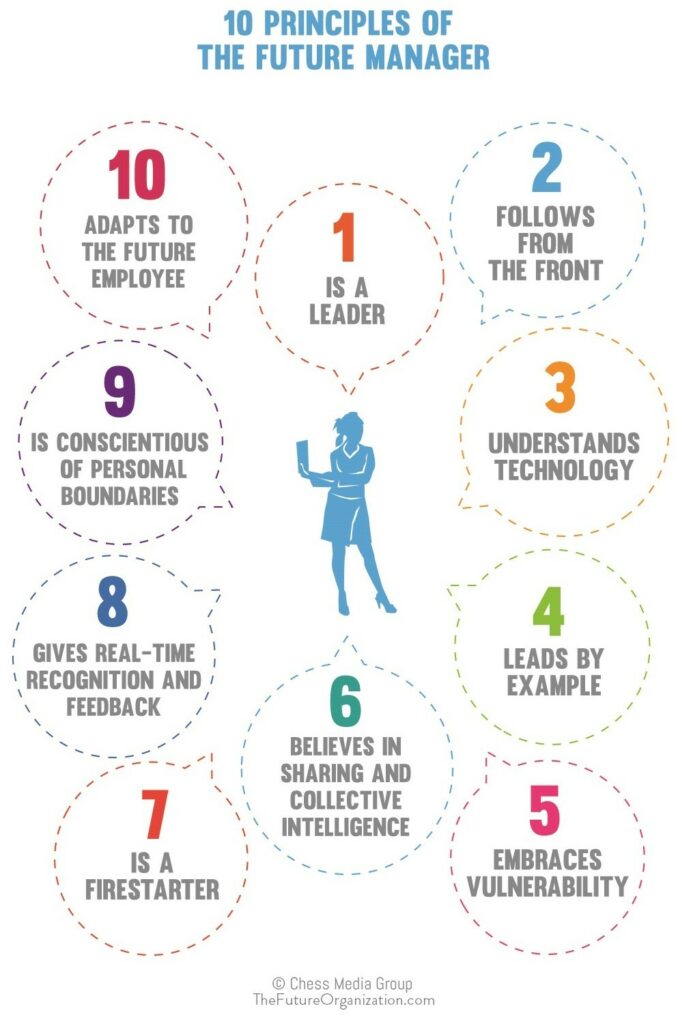Following up on my post around the 7 Principles of The Future Employee, I wanted to share another concept which is the 10 Principles of The Future Manager. When it comes to the future of work it’s not just employees that are changing, managers are also having to change the ways in which they lead and in fact are HAVING to become leaders. These are 10 core principles or characteristics that managers will and must possess going forward. This image is taken from my book, The Future of Work.
Is a leader
There has long been a distinction between managers and leaders. Managers were the dictators and leaders were the visionaries. Going forward a manager MUST be a leader, that is, he or she must earn followers and not command respect. Being a manager is something you earn not something you are assigned to do. A manager cannot be someone placed in a position of power simply because they bring in the most money or are the best at delegating.
Follow from the front
This concept is all about the manager’s responsibility to remove obstacles from the paths of employees. A manager exists to make his people more successful not to have his or her people serve them. When a manager follows from the front he paves the way and enables team members to become successful.
Understands technology
Managers don’t need to become experts at every new technology that comes their way. However, now that technology has become such a crucial part of how we live and work it has never been more important for managers to grasp which technologies have the potential to benefit the organization and which new technologies might be coming their way in the near future. A manager must a keep a good pulse on technology.
Leads by example
A manager must be the first person to demonstrate a new behavior, to support a relevant technology, or to embrace a new concept. A manager cannot lead by delegating and ordering, a manager can only lead by demonstrating; they are the guinea pigs, the ones on the front line, and the ones who will help drive change.
Embraces vulnerability
A manager need to be ok with asking for help, admitting when they are wrong or when they don’t know something, and will feel comfortable when team members ask questions and voice their opinions even though they may contradict theirs. Embracing vulnerability is what leads to innovation, it’s about bringing down the stereotypical façade that managers are supposed to have (being robots) and being people. We are already talking about robots replacing many human jobs, let’s not jump the gun by having managers act like “human” robots. Managers must be people.
Believes in sharing and collective intelligence
A manager understands and embraces the fact that they may not have all the answers or make the best decisions nor should they want or be expected to. A manager knows that it is far more effective to rely on the collective intelligence of a team instead of the directions of one. This manager also acknowledges the benefit and value in sharing information instead of hoarding it; something that is largely being made possible with collaborative technologies.
Is a fire starter
Managers are oftentimes credited with having to “put out fires,” but their role should be the exact opposite! Managers SHOULD be fire starters; that is sparking ideas, challenging convention, and experimenting.
Gives real time recognition and feed-back
Any manager worth their weight in salt knows that annual reviews are not effective for either the organization or the team members. Instead managers will focus on providing their team with real time feedback and recognition through collaborative technologies and platforms and through regular, short, periodic check-ins instead of multi-hour long reviews.
Is conscientious of personal boundaries
A manager recognizes that team members have their own space, both digitally and physically. This means respecting those boundaries and being aware of when it is appropriate to “friend” someone through social channels, if/when it’s ok to schedule a 6am meeting or a 10 pm presentation, or if it’s ok to send emails or projects through on the weekends or during vacation time. With our ability to always stay connected managers must remember that connectivity doesn’t always imply availability. A manager must work towards setting expectations that boundaries exist and are respected.
These are The 10 Principles of The Future Manager and you can learn more about them and plenty of other concepts around how the workplace is changing by reading my new book, The Future of Work.




